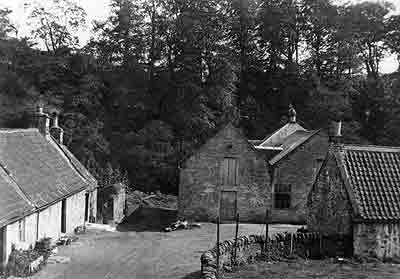Foulis: 300 years ago...
November - December
The month of November often brought bad weather to Woodhall. In 1699 there was a storm which Sir John Foulis noted lasted for three days while in 1702 "a great storm of snowe destroyed a great many trees both fruit and barren". There was little for it but to stock up on playing cards and candles and enjoy the penny weddings of his servants. He was a generous man and contributed far more than a penny or two to these occasions and without fail paid for the fiddlers, too.
But a real novelty could draw him into the city like the visiting elephant in 1705 for which he paid 13 shillings and 6 pence to see - and a little extra to feed it bread and ale!
November was also a month for Sir John's political duties. To keep abreast of national politics in 1706 he spent a shilling on a copy of Lord Belhaven's anti-Union speech and to discharge his local responsibilities he paid 14 shillings and 6 pence to the coachman to take himself and the sheriff depute out to inspect the highway. Further meetings with his fellow Justices of the Peace required heavy outlay on food and drink afterwards. But it's typical of Sir John that you then find frequent small gifts noted to "ye beggars" or "ane distrest woman" who in the period covered by his Account Books were struggling to survive one of the worst famines in recorded Scottish history.
Many older Scots will say that they did not celebrate Christmas much in their youth. Certainly Sir John Foulis of Woodhall only pays out for herring, cheese and apples for December 25th while he spends handsomely on duck, geese and a turkey for New Year celebrations.
December was a month of losses for Sir John. In 1700 he waved his son Alexander off to the East Indies in the good ship "Speedwell" after wining and dining Captain Campbell appropriately. December 1702 was lightened by the arrival of a letter from son "Sandie" even though it had taken eighteen months in transit! It was a small pleasure in the six-week-long agony of his third wife's deathbed. On December 28th he noted "My dear wife was removed this night about five o'clock" but not before four different doctors had been engaged for their opinions and seven billets had been sent to seven kirks to remember her in their prayers.
Through it all the duties of a landowner went on including collecting rent from his enterprising tenant William Denholm. Denholm was not only renting the Mains farm at Woodhall and the Curriemuir park (where Juniper Green would grow) but in 1704 he adds a mill to his tack. This was probably where Inglis mill stood (now replaced by the new Woodhall Mill development). At the same time expenses never stopped, with Sir John paying out eighteen shillings for his servant Tony's green stockings, twenty two shillings for servant Archie's and twenty four shillings for his own white ones. This leaves us wondering whether the different prices were due to different quality of hose or different size of leg!

